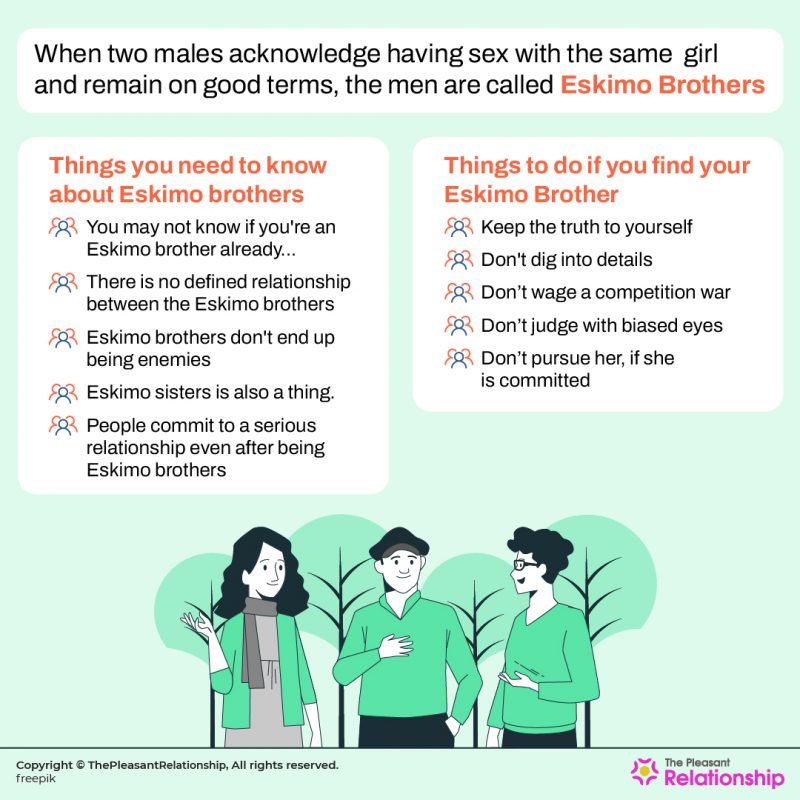Eskimo Brothers: The Controversial Origin Story Explained!
Ever found yourself in a situation where you share a peculiar connection with someone, a connection forged in the most unexpected of circumstances? The concept of "eskimo brothers," while potentially controversial, highlights the intricate, sometimes awkward, and often humorous ways in which human relationships can intersect. The term itself is a linguistic exploration into the boundaries of social norms, cultural appropriation, and the ever-evolving landscape of modern slang.
At its core, an "eskimo brother" refers to two men who have shared a sexual relationship with the same woman. This definition, however, is just the tip of the iceberg. Delving deeper reveals a complex web of cultural misinterpretations, comedic appropriation, and evolving societal attitudes towards sex and relationships. The phrase is less about actual brotherhood and more about acknowledging a shared experience, regardless of whether that experience fosters camaraderie or discomfort. The term gained traction in popular culture, particularly through television shows, solidifying its place in the lexicon of modern slang.
The journey to understanding the term "eskimo brothers" requires a delicate navigation through its origins, usage, and the cultural sensitivities it brushes against. While the phrase is often used in jest, its roots are intertwined with historical and cultural misconceptions that warrant careful consideration.
- Vegamovies Stream Bollywood Hollywood More Free Guide
- Watch Kannada Movies Online Latest Releases Where To Stream
The exact origin of the term remains somewhat shrouded in mystery, with various theories attempting to pinpoint its genesis. One prevailing theory links the term to a misinterpretation or fabricated narrative concerning the practices of certain Inuit and Aleutian communities. These communities, it is suggested, had customs involving polygamy or polyamory, particularly concerning married women and their interactions with male guests. Whether this reflects historical reality or is a romanticized (and potentially inaccurate) portrayal is a matter of ongoing debate. Regardless, the term "eskimo brothers" appears to have emerged from this distorted lens, appropriating cultural elements without fully understanding or respecting their context.
During the 1970s, the phrase "eskimo brothers" began to surface in American slang, primarily among young adults. This colloquial expression served as a lighthearted, albeit potentially offensive, way to describe two men who had engaged in sexual relations with the same person. The rise of the term coincided with evolving attitudes towards sex and relationships, as well as the growing influence of slang and informal language in popular culture. It is important to note that the term's usage was not without controversy, as its casual appropriation of indigenous culture and its potential for misogynistic undertones raised concerns among various groups.
The popular American sitcom Seinfeld is often credited with introducing the term "eskimo brothers" to a wider audience in 1999. This exposure, however, was merely a prelude to the term's true moment in the spotlight. The FX show The League further popularized the concept, with the character Taco (played by Jon Lajoie) explicitly defining it as "when two guys had sex with the same girl." Taco's character even leverages this shared experience to gain favors, such as free drinks, from his fellow "eskimo brothers." The League's comedic portrayal of the term cemented its place in popular culture, transforming it from a niche slang term into a more widely recognized, albeit still potentially problematic, expression.
- Sondra Blust Viral Videos Controversy Whats Real Discover
- Kannada Movies 2025 Find The Best Avoid Piracy Sites
However, it is essential to address the problematic nature of the term "eskimo" itself. "Eskimo" is considered a controversial exonym, referring to the Inuit (including the Alaska Native Iupiat, the Canadian Inuit, and the Greenlandic Inuit) and the Yupik (or Yuit) of Eastern Siberia and Alaska. The term carries a history of colonial baggage and is often perceived as derogatory by many indigenous people. Using "eskimo" in any context, including the phrase "eskimo brothers," perpetuates harmful stereotypes and contributes to the erasure of indigenous cultures.
Given the problematic connotations of the term "eskimo," efforts have been made to find alternative expressions that capture the same concept without appropriating or disrespecting indigenous cultures. Some suggestions include using more neutral terms like "shared partners," "common connections," or simply describing the situation without resorting to a specific label. The goal is to acknowledge the shared experience while avoiding language that is culturally insensitive or offensive. The challenge lies in finding a term that is both descriptive and respectful, allowing for open and honest conversations about relationships and shared experiences.
The term "eskimo sisters" follows a similar vein, referring to two women who have had sexual relations with the same man. This term, like its male counterpart, carries the same potential for cultural insensitivity and should be approached with caution. Exploring the roots of "eskimo sisters" requires sensitivity and respect for the communities whose cultures are being referenced. It is crucial to recognize the potential harm caused by appropriating cultural terms without understanding their true meaning and context.
It is important to distinguish between the slang term "eskimo brothers" and the legitimate cultural practices of Inuit and Aleutian communities. While the term may be loosely based on misinterpretations of these practices, it does not accurately reflect the complexities and nuances of these cultures. The reality of Inuit and Aleutian societies is far richer and more diverse than the simplified and often inaccurate stereotypes that are perpetuated by slang terms. It is essential to approach these cultures with respect and a willingness to learn, rather than relying on harmful stereotypes and misinformation.
The continued use of the term "eskimo brothers" raises important questions about cultural appropriation, the evolution of language, and the impact of slang on societal attitudes. While some may argue that the term is simply a harmless joke, others contend that it perpetuates harmful stereotypes and contributes to the erasure of indigenous cultures. The debate surrounding the term highlights the ongoing tension between freedom of expression and the need for cultural sensitivity. As language continues to evolve, it is crucial to engage in thoughtful discussions about the impact of our words and the responsibility we have to use them in a respectful and inclusive manner.
The origin of other slang terms and idioms, such as "arkees" (a Rhodesian word for school toilets), "offrian" (an Old English word), "let's blow this popsicle stand," "heroes never die," "on edge," and "gimme," offer a comparative perspective on how language evolves and adapts over time. Each of these terms has a unique history and cultural context, reflecting the diverse ways in which humans communicate and express themselves. Studying the origins of these terms provides valuable insights into the social, cultural, and linguistic forces that shape our language.
Even Lil Pump's 2017 tweet of "esskeetit" demonstrates how slang can rapidly evolve and spread through online platforms, further complicating the landscape of language and cultural expression. The internet has become a breeding ground for new terms and phrases, constantly challenging our understanding of language and its impact on society.
Ultimately, understanding the term "eskimo brothers" requires a multifaceted approach that considers its historical context, cultural implications, and evolving usage. While the term may appear whimsical or humorous on the surface, it carries a complex web of cultural baggage that warrants careful examination. By engaging in thoughtful discussions and promoting cultural sensitivity, we can navigate the complexities of language and ensure that our words are used in a way that is both respectful and inclusive.
- Jonathan Roumies Wife The Truth About His Relationship Status
- Anna Malygon Leak What Happened Why It Matters Now

Eskimo Brothers Meaning, Significance and Things You Need to Know

Eskimo Brothers Meaning, Significance and Things You Need to Know

What Does Eskimo Bros Mean? The Definition of Eskimo Brothers ️ YouTube